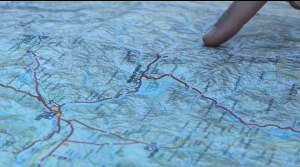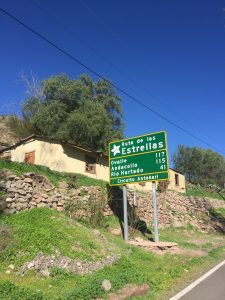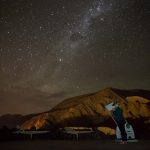It’s July 2, 2017 and the team is setting off from Upscape’s Santiago office early morning for one of many scouting trips. The destination is more unknown than usual, a set of coordinates in the Chilean desert. The purpose, to advance the plans for an event to come exactly two years from tomorrow–the total solar eclipse crossing Chile on July 2, 2019. The excitement was palpable, even then, for this phenomenon in the sky to come.
 While solar events are a new experience for us, what’s on the ground we are intimately familiar with. The Coquimbo region, situated between Santiago and the Atacama, is the corner of Chile’s desert known mostly by Chileans for its seaside town of La Serena, Fray Jorge National Park and globally for its world class observatories, including: La Silla, Cerro Tololo, Gemini Sur and Las Campanas. This has drawn stargazers for years, lending a mystical vibe to the local towns of Vicuña and Ovalle and creating the “Ruta de las Estrellas” or (Route of the Stars).
While solar events are a new experience for us, what’s on the ground we are intimately familiar with. The Coquimbo region, situated between Santiago and the Atacama, is the corner of Chile’s desert known mostly by Chileans for its seaside town of La Serena, Fray Jorge National Park and globally for its world class observatories, including: La Silla, Cerro Tololo, Gemini Sur and Las Campanas. This has drawn stargazers for years, lending a mystical vibe to the local towns of Vicuña and Ovalle and creating the “Ruta de las Estrellas” or (Route of the Stars).  Citrus farms and Pisco vineyards paint the desert landscape with bright green patches, like in Valle de Elqui (Elqui Valley) and Limari.
Citrus farms and Pisco vineyards paint the desert landscape with bright green patches, like in Valle de Elqui (Elqui Valley) and Limari.
We did our homework by speaking to an astronomer at ALMA, downloading apps to gage the light conditions and watching our GPS location compared to NASA’s trajectory of the sun’s shadow. The region is mountainous and remote, meaning access and viewing points are limited and will be difficult to navigate on the day of an event like this.
As the sun began to set, we dropped team members off along the route, each with the goal to hike their own section of the map to identify the best viewing plateaus. We’d go back the next day to speak with landowners and observatories. And then the following year to identify the best location for Outpost, our fully outfitted camp where travelers will sleep beneath the stars.

